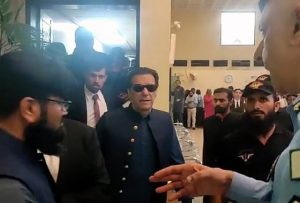Imran petitions the Supreme Court to end the ‘undeclared martial law’
Requires the Supreme Court to take note of ‘unconstitutional’ laws in three provinces and the capital of Islamabad

ISLAMABAD:
Imran Khan, leader of the Pakistan Tehreek-e-Insaf (PTI), has asked the Supreme Court to investigate what he calls “undeclared martial law” in some regions of the nation.
The PTI leader, through his attorney Hamid Khan, has filed a 49-page appeal with the Supreme Court, highlighting the continuous onslaught against his party, which is now facing an existential threat.
Imran calls attention in his plea to the use of “the aid of the armed forces in the Federal Capital Territory, Punjab, Balochistan, and Khyber-Pakhtunkhwa (K-P) under Article 245 of the Constitution.”
He claims that the federal government’s use of this authority in the absence of any objective conditions justifying it violates people’s basic rights.
Imran also asked the Supreme Court to form a panel headed by a Supreme Court judge to investigate the circumstances of his detention on May 9 and the events that followed.
Angry demonstrations erupted when Imran was detained in a swift raid on the premises of the Islamabad High Court (IHC), leading to the destruction of state property and army facilities and memorials.
After the riots, the coalition government began a huge crackdown on the PTI, arresting thousands of PTI supporters and filing criminal charges against the party’s top officials.
The decision to prosecute those responsible for the riots on May 9 under the Pakistan Army Act, 1952, and the Official Secrets Act, 1923 was approved by both civilian and military officials on May 17.
As the government crackdown worsened, scores of PTI leaders, including some of Imran Khan’s closest advisors, began defecting in what the PTI leader called “forced divorces.”
Cases against 16 “miscreants” will soon be handled in military courts.
In the case, Imran questioned the use of the Pakistan Army Act (1952) and the Official Secrets Act (1923) against civilian criminals, as well as the manner of his own detention, which the SC ruled was illegal on May 11.
“Whether the trial of civilian saboteurs who allegedly were involved in attacks on [Lahore] Corps Commander’s House, which is originally Jinnah House and a civilian house for legal purposes,” the document said.
In addition, the question of “whether the trial of civil offenses committed by civilians under the Army Act is contrary to the provisions of Article 4,9,10A,14 and 25 of the Constitution read with the UN Charter of Human Rights and other international charters” was raised.
The petition claimed that civilians’ rights to life, due process, fair trial, human dignity, and equal protection under the law would all be violated if they were tried in military tribunals.
It further argued that the “deliberate, mala fide, contumacious disregard” of Supreme Court rulings on election provision should be settled in court.
On April 4, the Supreme Court of Pakistan mandated that elections be held in Punjab on May 14. However, the legislature censured the Supreme Court and shot down a government measure that would have provided funding to organize elections in the provinces of Punjab and Khyber-Pakhtunkhwa.
The PTI head also asked the Supreme Court to look into the “unlawful arrests” of party officials and those suspected of vandalizing state installations “without the registration of cases under the applicable laws.”
“The arrests, investigation, and trial of civilians in peace-time under the [Pakistan] Army Act, 1952 read with the Official Secrets Act, 1923 [are] unconstitutional and void, of no legal effect and amounts to the negation of the Constitution, rule of law, and independence of the judiciary,” the petition argued.
The PTI party members, sympathizers, and employees who were arrested and detained under the Maintenance of Public Order rules were also deemed to be violating their constitutional rights by the court.
It contended that efforts to “dismantle the PTI through [forced] quitting of party membership and office” were invalid since they violated Article 17 of the Constitution.
The PTI’s leader, Imran Khan, was freed from the custody of the National Accountability Bureau (NAB) on May 11 thanks to the intervention of the highest court in the country.
Since Imran’s arrest on May 9, however, there has been a tremendous crackdown on the party leadership and workers for encouraging and carrying out attacks on state buildings and military sites, and it is now unclear who will emerge victorious in the second round of this struggle.
The political fate of the PTI once again rests in the hands of the supreme court.









































